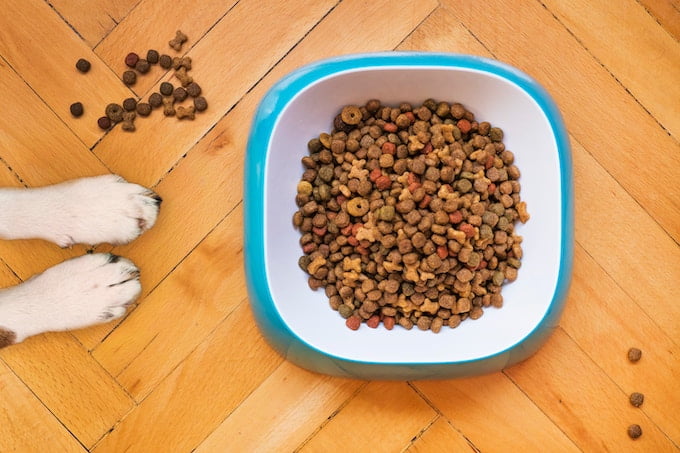This post may contain affiliate links, which means we may receive a commission from purchases made through these links. See our affiliate disclaimer.

Whether you’re considering making a change in your dog’s diet, or just want to learn more about dog food in general, you’ve come to the right place.
Here, we give you some core information about grain-inclusive and grain-free dog foods, and also talk about their nutrients and dietary benefits. Plus, a look into some questions about grain-free dog food that remain unanswered.
Dog food with grains
In order to better understand grain-free dog food, we provide some information about grains first. In this section we go into what grains are, what function they serve in dog food, and what benefits they provide in a dog’s diet.
What are grains?
Grains are the harvested seeds of grasses. In one form or another, they’re a staple in human diets around the world. They’re a very important source of carbohydrates in most cultures — think rice, or bread.
Grains are also a common ingredient in commercial dog food. Some common grains used in dog food include:
Most of the grains used in dog food are “whole grains,” which means they haven’t been stripped of their outer layers. Whole grains are healthy and provide essential nutrients.
Benefits of grains in dog food
Whole grains are a rich source of fiber, a type of carbohydrate which contains Vitamin B, some minerals (iron, copper, zinc, magnesium), antioxidants and phytochemicals. Some of the benefits of fiber in the diet include:
Whole grains are also a good source of healthy fats & proteins. Grains are one of the few non-meat sources of these nutrients; they’re cheap to produce, and the fats & proteins they provide are of good quality.
What health issues in dogs are associated with grains?
There are a couple health issues in dogs with a direct link to grains, and for which vets might recommend a grain-free diet.
Gluten intolerance is a disordered response to a protein (gluten) found in some grains, such as wheat, barley & rye. Gluten intolerance is rare in dogs. (Note that not all grains contain gluten; some, such as oats, brown rice and corn, are gluten-free.)
An allergy to grains is possible in dogs. While not quite as common as meat or dairy allergies, an allergy to wheat, soy or corn accounted for 13%, 6% and 4%, respectively, of all food allergies in dogs in this study.

Grain-free dog food: the good and the bad
There’s a lot of claims floating around on the internet about grain-free dog food, and in this section we address some of the more common ones. But first, we talk a bit about what “grain-free” is.
What exactly is “grain-free”?
In order to label their food “grain-free,” dog food manufacturers have had to drop grains from their ingredient list. Alternate sources of carbohydrates found their way onto their recipes to replace grains, including:
Each of these carbohydrates have their own benefits, with generally favorable nutritional profiles. It would be inaccurate to say any one of these is better or worse than grains. Used in appropriate amounts, they serve their nutritional purpose, just as grains do.
Despite being no better or no worse than dog food with grains, they quickly became a popular type of dog food.
The rise of grain-free dog food
Grain-free dog food is a relative newcomer in the arena of commercial dog food. These food products hit the market around 2007, not long after grain-free diets grew in popularity among humans. “Grain-free” became a buzzword that pet food companies capitalized on. They claimed these were a healthier alternative to dog food with grains, and that they were hypoallergenic.
It’s important to note here that these grain-free food products passed the standard quality tests of the AAFCO. The AAFCO is the authority on such matters, and passing their tests means the food was not only safe to consume, but also a complete & balanced diet for dogs.
Grain-free dog food exploded in popularity soon after it entered the market, with many dog food manufacturers and consumers touting its superiority over dog food with grains.
The arguments for grain-free dog food
Here we go over some of the common claims made about grain-free dog food, and we set the record straight on them. The short version: there are no medically-proven benefits of a grain-free diet, according to vets.
Grain-free dog food is good for weight loss — false. There is a common misconception that grain-free dog food is low in carbs, which is simply not true. They contain alternative carbohydrates which may or may not have more calories. Rather than looking at the ingredients, we advise taking a look at the amount of calories per cup of dog food. Your dog’s weight will ultimately be decided by the amount of food he eats.
Grain-free dog food is hypoallergenic — false. While grain allergies are relatively common in dogs, dog food that is free of grains may still contain other common allergens. Beef was by far the number one reported allergen in this study, followed by dairy, chicken, wheat (a type of grain), and lamb. If you suspect a food allergy in your dog, talk to your vet before making any changes to your dog’s diet.
Grain-free dog food causes dilated cardiomyopathy — false. This is a tough one, but we’re going to have to go with “false” on this, at least until there’s further evidence one way or the other. We go into much further detail on this in the section below.
The unanswered: dilated cardiomyopathy
There is some controversy regarding grain-free dog food that is centered around Dilated Cardiomyopathy (DCM), a heart disease in dogs with arguable links to grain-free dog food. Below we provide a summary of the pertinent events, and an overview of where we are now.
The short version: a link between grain-free diets and DCM has not been proven, nor has it been disproven.
The first reports of DCM emerge
In 2017 & 2018, some veterinarians keenly noted an increase in the number of DCM cases they were seeing in their clinics. Other than the increased number of cases, they also noted it was occurring in dog breeds that were not previously known to have a genetic predisposition to DCM. They reported their findings to the FDA.
In 2017, there were only 3 reported cases of DCM to the FDA. In 2018, that number jumped to 320. This sudden & alarming increase in the number of DCM cases spurred the FDA to start an investigation.
The FDA gets involved
In 2018, the FDA released their first report on this matter. In this report, they merely stated the characteristics of the dogs (& cats) that had been diagnosed with DCM. Stuff like age, weight, sex & breed of the dogs. They also included details about the diets of these dogs — type of food, brand of food, ingredients of interest.
It’s important to note here that the FDA has the authority to investigate pet food-related concerns, but not any health-related concerns. (There is no governing body on health for dogs/pets in the USA, such as the Center for Disease Control for humans.) So the FDA did what they could: primarily investigating a link between dog food and DCM, but also working with veterinary cardiologists to examine some of the affected dogs.
In later reports, the FDA listed some common factors from their initial investigations: grain-free dog food seemed to be the primary factor they were looking at. They also named specific ingredients (peas, lentils, potatoes), and even specific dog food brands that were of interest at that point — an unusual move, releasing such information about an ongoing investigation.
As expected, this was widely reported by the media and caused a drop in grain-free dog food.
We feel obliged to mention at this point that, in the ensuing months, there was an investigative report which detailed the conflicts of interest of the key veterinarians that brought this matter to the FDA’s attention; this was echoed by a reputable news outlet.
Where we are now
The FDA has issued four official reports to date, and in each they have stated categorically that no established link has been found between DCM and any kind of dog food.
A final, conclusive report has yet to be issued in the 5 years since; they have not made any actionable recommendations, nor have they recalled any dog food products.
They assure the public that their investigation is ongoing, and that they will issue a public statement once there are any major developments.
The bottomline
Talk to your veterinarian about your dog’s diet.
If you’re considering making a change to your dog’s diet, grain-free or otherwise, a trusted vet will be able to help you more than any information currently available on the internet can. If you suspect a health issue related to grains in your dog, a vet will be able to help you confirm or reject these suspicions.
In the meantime, we will wait for the FDA to conclude their investigation and make their final recommendations. This section will be updated once they do.

